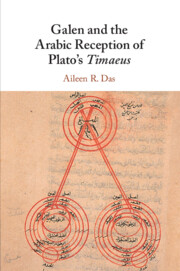Book contents
- Galen and the Arabic Reception of Plato’s Timaeus
- Galen and the Arabic Reception of Plato’s Timaeus
- Copyright page
- Dedication
- Contents
- List of Figures
- Acknowledgements
- Notes on Texts, Translations, and Transliterations
- Abbreviations
- Introduction: Plato’s Timaeus as Universal Text
- Chapter 1 Galen and the ‘Medical’ Timaeus
- Chapter 2 From the Heavens to the Body: Ḥunayn’s Ophthalmology
- Chapter 3 Al-Rāzī: The ‘Arab Galen’ and his Plato, New Disciplinary Ideals
- Chapter 4 Laying Down the Law: Avicenna and his Medical Project
- Chapter 5 Uprooting the Timaeus: Maimonides and the Re-medicalization of Galenism
- Conclusion: Medicine Disciplined
- References
- Index Locorum
- General Index
Chapter 4 - Laying Down the Law: Avicenna and his Medical Project
Published online by Cambridge University Press: 30 October 2020
- Galen and the Arabic Reception of Plato’s Timaeus
- Galen and the Arabic Reception of Plato’s Timaeus
- Copyright page
- Dedication
- Contents
- List of Figures
- Acknowledgements
- Notes on Texts, Translations, and Transliterations
- Abbreviations
- Introduction: Plato’s Timaeus as Universal Text
- Chapter 1 Galen and the ‘Medical’ Timaeus
- Chapter 2 From the Heavens to the Body: Ḥunayn’s Ophthalmology
- Chapter 3 Al-Rāzī: The ‘Arab Galen’ and his Plato, New Disciplinary Ideals
- Chapter 4 Laying Down the Law: Avicenna and his Medical Project
- Chapter 5 Uprooting the Timaeus: Maimonides and the Re-medicalization of Galenism
- Conclusion: Medicine Disciplined
- References
- Index Locorum
- General Index
Summary
Chapter four focuses on Avicenna's endeavour in his famous Canon of Medicine to reassert the epistemic authority of philosophy by restoring the proper boundaries of medicine, which Galen had especially obscured through his engagements with Plato's Timaeus. I maintain that Avicenna, a student of Aristotle, formulates this polemic in response to the threat that Galen's defence of the dialogue's brain centred psycho-physiology posed to the credibility of Aristotelian cardiocentrism, which identified the heart as the source of sensation. This study examines how Avicenna appeals to the restrictive epistemic hierarchies of his intellectual milieu, which limit doctors to subjects only relevant to the production or preservation of bodily health, to delegitimize Galen's contributions to natural philosophy. The rhetorical, as opposed to normalizing, force of the disciplinary prescriptions that he levels at Galen in the Canon of Medicine will become clear from my analysis of Avicenna's discussions of the hegemonic organ and pleasure in his philosophical works, where he transgresses his own 'laws' when disputing or even adopting TImaean positions on these issues.
Keywords
- Type
- Chapter
- Information
- Galen and the Arabic Reception of Plato's Timaeus , pp. 140 - 169Publisher: Cambridge University PressPrint publication year: 2020

